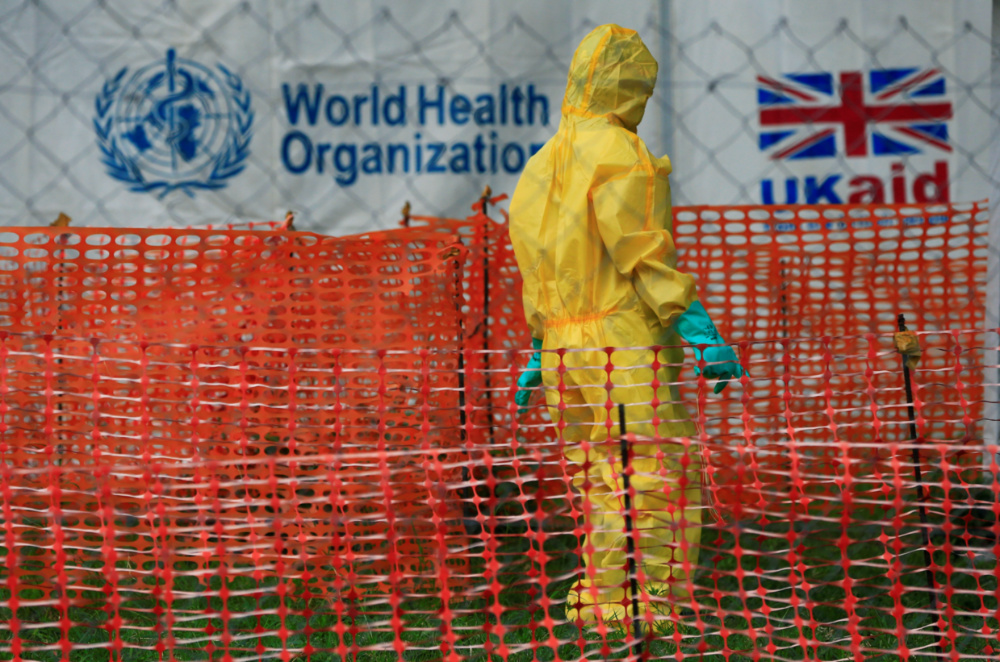London, UK
Thomson Reuters Foundation
Aid organisations and humanitarian agencies should face tougher action including funding cuts if they do not tackle sexual abuse by staff, aid experts told UK parliamentarians on Tuesday amid a sex-for-jobs scandal during an Ebola crisis in the Congo.
There is a “culture of impunity” for abusers and organisations believe they “are above the law”, typically seeking to protect their own reputations ahead of offering support and justice for victims, experts said.

A person dressed in Ebola protective apparel is seen inside an ebola care facility at the Bwera General Hospital near the border with the Democratic Republic of Congo in Bwera, Uganda, on 14th June, 2019. PICTURE: Reuters/James Akena/File photo.
The hearing came after an investigation last week by the Thomson Reuters Foundation and The New Humanitarian revealed 51 women accusing mainly foreign aid workers of forcing them into sex during an Ebola outbreak in the Congo between 2018-2020.
“The UN, the NGOs believe they are above the law,” Professor Andrew MacLeod of Hear Their Cries, a charity fighting sex abuse in the aid sector, told the International Development Committee investigating sex abuse and exploitation in aid.
“Predators now target the aid industry to join because they know they get away with it.”
UN Secretary-General Antonio Guterres has called for the allegations of sex abuse in Congo to be “investigated fully”.
Five of seven UN agencies and humanitarian groups named in the nearly year-long investigation have announced inquiries, including the World Health Organization, UNICEF, International Organization for Migration, World Vision and medical NGO ALIMA.
Guterres promised, when appointed in 2017, to make tackling the decades-old scourge of sexual abuse and exploitation in the aid sector a top priority after a string of controversies.
But Paula Donovan, co-director of AIDS-Free World’s Code Blue Campaign against sex abuse by UN personnel, said Guterres seemed “to have forgotten about his top priority entirely”.
She said claims of “zero tolerance” for abuse rang hollow in the light of the recent expose in which women said numerous men had either propositioned them, forced them to have sex in exchange for a job or ended contracts when they refused.
“Stop saying it. Nobody believes it, it’s a ridiculous empty phrase,” she told the hearing, adding it was critical to let impartial, objective teams conduct investigations.
No-one from the UN was immediately available to comment.
The Congo scandal highlights how investigation systems set up by agencies are typically done so to protect organisational reputation ahead of justice for abuse victims, said MacLeod.
Human rights lawyer Sienna Merope-Synge, based at NYU School of Law, said many survivors don’t report abuse because they have “no faith in the systems and they are afraid”, while there was a “culture of impunity” in humanitarian organisations.
The UN also faced particular criticism over its handling of legal immunity for personnel – a mechanism designed to protect the organisation from politically-motivated attacks.
“Despite the UN’s repeated claims they will lift the immunity it’s a case-by-case basis and they just don’t do it very often, if at all,” said Edward Flaherty, a lawyer at the Geneva-based firm Schwab, Flaherty & Associés.
Victims face “black hole” over cases
Those who do report incidents to the UN face a “black hole” of information over their case, said Merope-Synge, who has represented women in Haiti who had children fathered by UN peacekeepers.
While UN support was “piecemeal” and inadequate, in the humanitarian sector it appeared even more inconsistent and lacking transparency, she added.
The hearing was told aid agencies should face tougher consequences for failing to take action on abuse.
One possible avenue was a US Government scheme in which international organisations failing to meet best practices to protect whistleblowers lost 15 per cent of state funding, said Flaherty.
But Merope-Synge warned stripping funding could create a “perverse incentive” to hide abuse by staff for fear of the consequences.
MacLeod, however, called for funders to go further, saying all cash should be withheld from organisations facing claims of sex abuse by staff until they have been satisfactorily resolved.
“At the end of the day, you have got to cut their funding or send people to jail or nothing will change,” he said.






